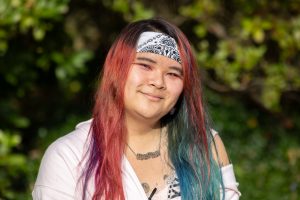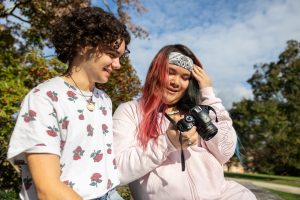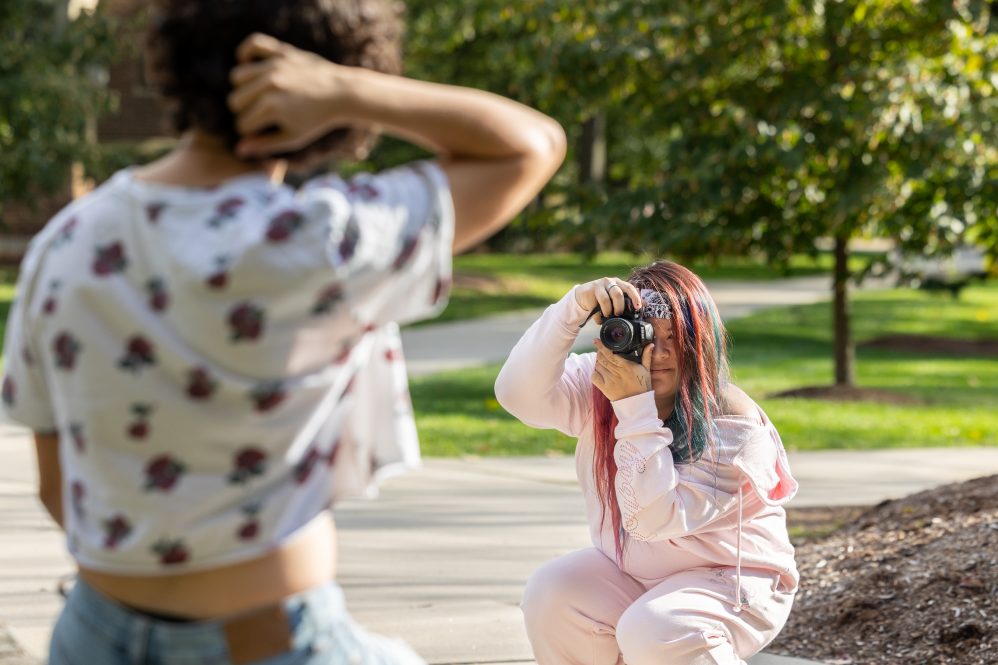Alexa Udell will almost always suggest the outdoors as a photographic backdrop for a formal portrait and will almost always recommend the winding backroads of northeastern Connecticut.
Whether framed in the colors of autumn or monochromatic in shades of green, the open road is a Goldilocks location, she says, even in winter when black asphalt and white snow contrast to make a human subject pop like red lipstick on a pale face.
Oftentimes, those being photographed take her up on the suggestion, eager for natural light and an escape into the woods. Sometimes, though, they prefer the privacy of the indoors and the comforts of home. Whatever they decide, Udell’s goal is always the same – to photograph her subjects in a way that reflects their natural and true selves.
“It’s a personal mission of mine to make sure that trans people have photos of themselves that make them feel proud and happy,” Udell ’24 (CLAS) says. “Some people aren’t safe to express their gender at home or in public. They can’t be their authentic self, and that’s an unfortunate reality. Because of that, it’s important to capture the image of how they see themselves in their heads, so they can say, ‘This is my identity. This is me, and I’m proud of that.’”

It’s a project Udell – who describes herself as a psychological sciences major with a cognitive science minor and a co-curricular focus in photography – conceived last Valentine’s Day when she dressed in pink, had her makeup done, and did a photoshoot, this time as a subject.
“It was so euphoric and made me feel so feminine in a way that I hadn’t really ever experienced before,” she says. “Having a formal photo shoot made me feel beautiful and more importantly made me feel affirmed. It was then I thought about doing a project that would bring that same feeling to a bunch of different people at once.”
While sharing the same opportunity was her first thought, her next was the realization of how important it is to highlight the individualism of people in the trans community – differences in the way people describe themselves, how they project that image to the world, what pronouns they choose, among so many other things – so those on the outside can see their diversity.
Her project, “Trans-Photography: Gender Euphoria and Expression Through Portraiture,” funded by an IDEA Grant through the Office of Undergraduate Research, puts Udell behind the camera to photograph members of the trans community at UConn and beyond. It will culminate with a gallery show and artist talk in the spring, along with a presentation at the Spring Frontiers in Undergraduate Research Exhibition in April.
‘Self-image is a tricky thing’
Remi Dupuis ’26 (CLAS) says he’s been able to live his authentic self for a while now, but even still there are some family photos he wouldn’t want many people to see.
“When you’re being photographed as yourself in the light that you want to be shown in by a photographer who is trans and who understands that experience and wants to help you in every way, that’s so different. Family photographs can be fine if you feel comfortable in your skin, but that’s not always the case,” Dupuis says. “So, yeah, there are photographs of me and my family that I wouldn’t want shown to the public. Self-image is a tricky thing with all the other factors that go into the trans experience. It’s lovely when you get to sort of control your own image in a way that makes you feel best.”
One recent fall day in the shade garden behind the William Benton Museum of Art, Dupuis and Udell talked about what Dupuis might want for his upcoming photo shoot.
“Something just like this,” he says, gesturing to nature around him and to his outfit picked out in case the meeting resulted in some photos, which it did.
Dupuis says trans people can be represented in the media in any number of ways, affecting other’s judgments and observations. For a project like Udell’s to validate, celebrate, and educate others about the trans community is a significant thing.
“It’s so important for trans bodies to be celebrated and recognized as normal because there’s a lot of misinformation out there,” he says. “It’s just really cool to get the representation from an authentic point of view, to see people enjoying being themselves and not having to worry so much about what other people think. That’s our everyday existence and it’s hard.”

Udell put out a survey early this semester seeking trans people who would like to be part of her project. She hoped for 10, but from that call received 25 responses, with 17 of those moving forward with photo shoots, which are being arranged now.
She says that as she’s contacting people, she’s interviewing them to take note of individualized styles, personal interests, potential locations for the photo shoot, and best time of year, so she can work with them to customize an appointment.
One friend, she explains, celebrated their 21st birthday recently and wanted to document their excitement. With balloons, streamers, and other inexpensive decorations in the background, they did the photo shoot in the friend’s dorm room.
For another friend who wanted photos of their new red snowsuit, out to the snow-dusted backroads of northeastern Connecticut they went early this year.
“I love the way the roads in New England look when they’re all wet,” Udell says. “We just went out to Mansfield Hollow. Around here, there are just so many good settings.”
Shared struggles bring connection
In addition to helping her subjects settle on outfits, locations, and props, Udell says she’s careful to work with the person to find a flattering way to pose – because she knows there are things about a person’s body that might not be the most flattering or might not help project the masculinity or femininity they feel.
She acknowledges she’s better at posing females because over the last few years she’s studied her favorite social media influencers and how they move their hands, flip their hair, tilt their head, or cross their legs. Simply, she’s modeled herself after those who gave her gender envy and mirrored their mannerisms.
“The thing people don’t realize about being trans is that you have to learn how to express yourself and do everything manually,” she explains. “If you were socialized as a different gender than what’s affirming, you have to learn it and figure it out. It’s a lot for someone, never mind when they’re having their picture taken.”
But with that shared struggle, Udell connects with her subjects to carry them through what otherwise could be an unnerving or uncomfortable experience.
Dupuis says he would think twice about doing a formalized photo shoot with someone who isn’t trans. He says he’d have to get to know that person before committing to make sure they’re a good ally for the LGBTQ+ community.
Udell, who in addition to a resume of extracurricular pursuits also is the co-team lead of student programs at the Rainbow Center, fits that bill.
She’s been taking photographs since getting a camera in the summer of 2021 and before that staging shoots on her phone. Over the last two years her skills have improved, and side gigs have filled her calendar as friends have asked for pictures and event organizers have sought to document concerts, symposiums, conferences, and trips.
For the last two years her Nikon D3400 with a 50 mm f/1.8 lens has been her best friend, and this semester she’s enrolled in Basic Studio Photography in which she says she’s trying to learn more about product photography. Next semester, as she wraps up her undergraduate work, she plans to take another photography course.
“Photography is one of the best parts of my life,” Udell says. “My goal is that everyone who wants photos from me comes away with beautiful, professional quality photos of themselves that make them feel how they see themselves. That’s a big thing. I see myself in a certain way, that’s my sense of self in my head. But the way I look when other people take photos of me or when I’m on a store camera aren’t necessarily how I see myself.”
She continues, “One of the things I try to do with my life is merge the work that I do with my social identities and try to be a good ally to other communities. My work is meant to amplify the voices of marginalized groups, even beyond gender and sexual minorities, to make sure everyone’s voice is heard.”



